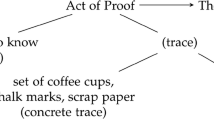
Overview
- Advances understandings of definitions of argumentation, justification, and proof in classroom practice
- Illustrates the importance of theoretical frameworks through analysis of classroom data from grades K-16
- Considers the implications of one’s conceptions and theoretical choices for teaching and research
Part of the book series: Research in Mathematics Education (RME)
Access this book
Tax calculation will be finalised at checkout
Other ways to access
About this book
This book aims to advance ongoing debates in the field of mathematics and mathematics education regarding conceptions of argumentation, justification, and proof and the consequences for research and practice when applying particular conceptions of each construct. Through analyses of classroom practice across grade levels using different lenses - particular conceptions of argumentation, justification, and proof - researchers consider the implications of how each conception shapes empirical outcomes. In each section, organized by grade band, authors adopt particular conceptions of argumentation, justification, and proof, and they analyse one data set from each perspective. In addition, each section includes a synthesis chapter from an expert in the field to bring to the fore potential implications, as well as new questions, raised by the analyses. Finally, a culminating section considers the use of each conception across grade bands and data sets.
Similar content being viewed by others
Keywords
Table of contents (25 chapters)
-
Front Matter
-
Argumentation, Justification and Proof in an Elementary Classroom
-
Front Matter
-
-
Argumentation, Justification and Proof in a Middle Grades Classroom
-
Front Matter
-
-
Argumentation, Justification and Proof in High School Mathematics
-
Front Matter
-
Editors and Affiliations
About the editors
Kristen Bieda is an associate professor of Teacher Education and Mathematics Education at Michigan State University. She also holds an appointment as the Associate Director of Mathematics for the CREATE for STEM Institute. Prior to her appointment at Michigan State, she taught mathematics at the middle school, high school and community college levels. Her research interests include understanding how to incorporate mathematical justification into school mathematics, particularly at the middle school level. She is also interested in the design of clinical experiences that support prospective teachers in learning to teach ambitiously. She is currently the subject area leader for secondary mathematics for Michigan State’s secondary mathematics teacher preparation program.
AnnaMarie Conner is a professor of Mathematics Education in the Mary Frances Early College of Education at the University of Georgia. She investigates teachers’ beliefs and identity construction during teacher education and how teachers learn to support collective argumentation in mathematics classes. These two lines of research come together in findings describing how teachers’ beliefs impact their classroom practice with respect to collective argumentation. Dr. Conner’s work investigates the complex connections between teacher education, teacher characteristics, and teacher practice. She is currently collaborating with secondary mathematics teachers in supporting mathematical arguments as well as investigating how elementary teachers navigate infusing argumentation into integrative STEM instruction.
Karl W. Kosko is an associate professor of Mathematics Education at Kent State University. His work focuses on how mathematical meaning is conveyed, and has addressed classroom argumentation and discourse, multiplicative reasoning, and use of representations of practice in teacher education.
Megan Staples is an associate professor of Mathematics Education in the NeagSchool of Education, University of Connecticut. Her teaching focuses on the preparation of secondary math teachers. Her research focuses on how teachers organize classroom environments that support powerful practices such as collaboration, justification and argumentation. She has served as PI and Co-PI on multiple grants focused on justification and argumentation including the NSF-funded JAGUAR project, and a state-level Math-Science Partnership grant, Bridging Math Practices.Bibliographic Information
Book Title: Conceptions and Consequences of Mathematical Argumentation, Justification, and Proof
Editors: Kristen N. Bieda, AnnaMarie Conner, Karl W. Kosko, Megan Staples
Series Title: Research in Mathematics Education
DOI: https://doi.org/10.1007/978-3-030-80008-6
Publisher: Springer Cham
eBook Packages: Education, Education (R0)
Copyright Information: The Editor(s) (if applicable) and The Author(s), under exclusive license to Springer Nature Switzerland AG 2022
Hardcover ISBN: 978-3-030-80007-9Published: 04 March 2022
Softcover ISBN: 978-3-030-80010-9Published: 05 March 2023
eBook ISBN: 978-3-030-80008-6Published: 03 March 2022
Series ISSN: 2570-4729
Series E-ISSN: 2570-4737
Edition Number: 1
Number of Pages: XV, 333
Number of Illustrations: 34 b/w illustrations, 12 illustrations in colour
Topics: Mathematics Education, Learning & Instruction, Teaching and Teacher Education



